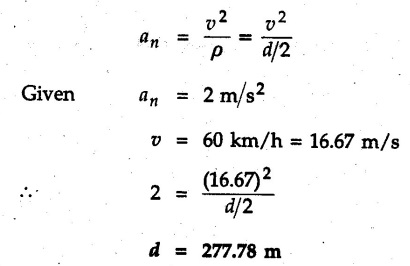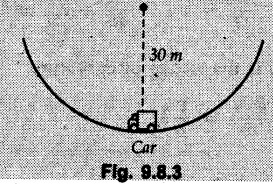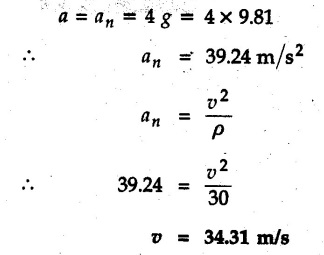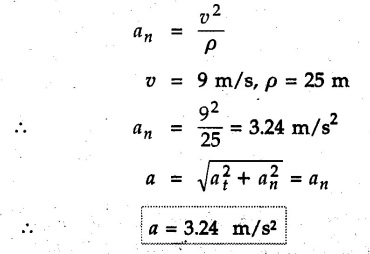Engineering Mechanics: Unit V: Dynamics of Particles
Solved Example & Practice Problems: Normal and Tangential Components (Path Variables)
Curvilinear Motion
Solved Example Problems, Examples for Practice: Normal and Tangential Components (Path Variables) - Dynamics of Particles - Engineering Mechanics
Normal and Tangential Components (Path Variables) - [ Curvilinear Motion - Dynamics of Particles ] Solved Examples for Understanding Example 9.8.1 An automobile is being driven along a circular track of diameter 'd'. Determine the value of 'd' if the normal component of acceleration is 2 m/s2 for a speed of 60 km/h. Solution : Example 9.8.2 A car is moving with constant speed along a circular path of radius 30 m. If for safety considerations, the acceleration is not to exceed 4 g, determine the maximum speed of the car. Refer Fig. 9.8.3. Solution : Given ρ = 30 m, at = 0 (constant speed) Example 9.8.3 A car starts from rest on a circular curve of 250 m radius and accelerates at a constant tangential acceleration 1.2 m/s2. Determine distance travelled and time taken when magnitude of total acceleration of car becomes 1.5 m/s2. Solution: Given at = 1.2 m/s2 (constant) a = 1.5 m/s2 As tangential acceleration is constant, we can use kinematical equations in tangential direction. u = 0, v = 15 m/s, a = 1.2 m/s2 Example 9.8.4 A car moves on a circular path of radius 25 m, with a uniform speed of 9 m/s. Determine the total acceleration of the car. Solution: As speed is constant, at = 0 Examples for Practice Q.1 The driver of an automobile starts from rest and increases his speed uniformly to 72 km/h in 10 seconds on a curved road of radius 500 m. Determine the magnitude of total acceleration 6 seconds after start. [Ans.: 2.021 m/s2] Q.2 A speed of racing car is increasing at constant rate from 100 kmph to 120 kmph over a distance of 180 m along a curve of 240 m radius. Determine magnitude of total acceleration of car after it has travelled 120 m along the curve. [Ans.: 4.26 m/s2 ] Q.3 A particle is traversing a curved path of radius of curvature 300 m with a speed 108 km/h and a tangential acceleration 4 m/s2. Determine total acceleration of the particle. [Ans.: a = 5 m/s2, 36.87° with êt]





Engineering Mechanics: Unit V: Dynamics of Particles : Tag: : Curvilinear Motion - Solved Example & Practice Problems: Normal and Tangential Components (Path Variables)
Related Topics
Related Subjects
Engineering Mechanics
ME3351 3rd semester civil, Mechanical Dept | 2021 Regulation | 3rd Semester Mechanical Dept 2021 Regulation
